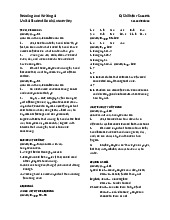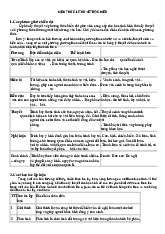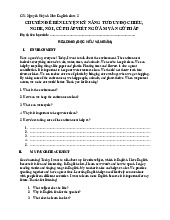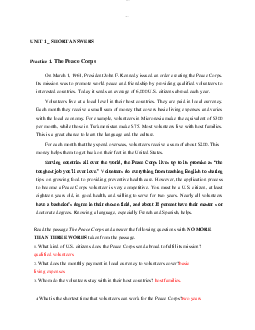



Preview text:
lOMoAR cPSD| 58507440 Reading and Writing 4 Q: Skills for Success
Unit 3 Student Book Answer Key Second Edition
The Q Classroom Activity A., p. 62
Activity D., pp. 68–69
Answers will vary. Possible answers:
1. Adolescence is a difficult period (including 1.
I remember my first day of school. I was
making poor decisions, hanging out with the
scared and excited at the same time.
wrong friends, taking risks, refusing to 2.
Parents and their children sometimes
follow rules, not talking to parents).
disagree about what the child should eat or wear.
2. The Five C’s are competence, confidence, 3.
The child on the left looks happy because
connection, character, and caring.
he is about to get the toy. The child on the right
3. Eliza has the five C’s.
is struggling. I think that the children will learn
4. Teens need opportunities that nurture how to share.
positive interactions with adults, develop Activity B., p. 62
life skills, and give them a chance to show
Answers will vary. Possible answers: leadership. 1.
Felix - have to work for what I want;
5. Good parenting nurtures qualities like
contribute to the family. Sophy – care for
honesty, empathy, self-reliance, kindness,
others and to share – room, clothes and toys
cooperation, self-control, and cheerfulness. Yuna– values and culture.
Activity E., p. 69 1. a 2. c 3. b 4. a 5.
One lesson I learned was how to share with my b
6. a 7. b 8. c Activity F., p. 70 siblings.
1. T paragraph 1 lines 10 & 11; lines 16 & 17 2.
Right and wrong; adopt same habits as
2. T paragraph 2 lines 3 & 4
parents whether we mean to or not. I agree
3. F paragraph 3 lines 6-9 Dr. Richard Lerner
with Sophy that I can have different habits from
conducted the 4-H study 4. T paragraph 3 those of my parents. lines 18-21
5. T paragraph 7 lines 8-11.
READING 1 PREVIEW THE READING Activity A.,
6. T paragraph 7 lines 8-11 p. 65
7. T paragraph 8 lines 10-12
Answers will vary. Sample answers: They take
8. F paragraph 9 lines 5&6 Parents should let
on more responsibility, like caring for younger teens have some independence.
children. They may help out more at home.
Their school work becomes more difficult. They
WRITE WHAT YOU THINK Activity A., p. 70
may become more interested in social activities.
Answers will vary. Sample answers: 1.
Speaking in public involves confidence
WORK WITH THE READING Activity B., p. 68
because it can be scary, and connection 1. colleague 2. consistent with
because you need to communicate with 3. theoretically 4. accurately
others./ Playing on a sports team requires 5. extracurricular 6. select
competence in a physical skill and confidence 7. equipped with 8. competence
that you can play. You also have to connect 9. nurture 10. assumption
with your teammates. / Reading to children 11. innate 12. period
requires competence because you must be
able to read, and connection and caring lOMoAR cPSD| 58507440 Reading and Writing 4 Q: Skills for Success
Unit 3 Student Book Answer Key Second Edition
because working with children requires patience.
forty pounds (thin); tense; walked funny; got 2.
Other activities include doing chores, funny (Paragraph 4)
having a part-time job, and participating in
3. to explain why she became a writer school clubs. (Paragraph 4) 3.
I can remember having very little
4. She could make a story vivid and funny;
confidence when I was younger. Even when I
exaggerate; make people seem larger
knew the answer in school, I was too nervous to
(more important) and give events a sense
say it. My teacher helped me to be less scared.
of larger significance or meaning
She called on me often, and slowly I felt better
(Paragraph 5) 5. She was different from about sharing my answers.
other kids; she thought more and
differently; she was shy; she was alone a
READING SKILL Activity A., p. 71
lot; she was odd, so she escaped into books
The following items are checked: 1, 3, 6, 7, 10 (Paragraph 7) Activity B., p. 72 Activity F., p. 77
1. a (When I was a young child)
I could make a story happen. I could make it
2. b (The writer mentions older siblings) 3. a and
vivid and funny, and even exaggerate some of
b (I have always had to struggle to get out of
it so that the event became almost mythical
bed in the morning; When I was a young child,
and the people involved seemed large, and
the problem wasn’t so bad) 4. a (The writer’s
there was a sense of larger significance, of
father would knock on the door at 6:00). meaning.
5. a (The writer would respond, “One or the (Paragraph 5) other, Dad.”)
He could take major events or small episodes
from daily life and shade or exaggerate things
READING 2 PREVIEW THE READING Activity A.,
in such a way as to capture their shape and p. 73
substance, capture what life felt like in the
She decided to become a writer because of her
society in which he and his friends lived and father. worked. (Paragraph 6) Activity G., p. 77
WORK WITH THE READING Activity B., pp. 75–76
1. b (the writer wanted her father to be 1. motivate
2. exaggerate 3. rely on
more like other fathers and have a regular 4. capture
5. significance 6. episode
job) 2. a (the writer’s father used his 7. refuge 8. suspect 9. impassioned
travelling as ideas for his writing)
10. profound 11. creative 12. resentful
3. b (a fly in the ointment is a problem; thus,
Activity D., pp. 76–77
writing something can be a problem)
a. 3 b. 2 c. 5 d. 7 e. 1 f. 4 g. 6 Activity E., p. 77 4. a. (like me)
1. Life isn’t always easy, and unexpected things
happen; life keeps happening (Paragraph 2) 2.
Shy; strange looking; loved reading; weighed lOMoAR cPSD| 58507440 Reading and Writing 4 Q: Skills for Success
Unit 3 Student Book Answer Key Second Edition
WRITE WHAT YOU THINK Activity A., p. 78 II.
A. Important or interesting detail: My
Answers will vary. Sample answers:
mother never wanted to let me. 1.
A doctor needs to have competence and
B. Sometimes I begged until she let me take
confidence so that she can make people feel
them down and clean them. III. Body
better and they will trust her. She also needs to
paragraph 2: Main event in story: My earliest
be caring and make connections so that she can
memory of washing the cups was when I was work well with her patients. five. 2.
My father influenced me as a teenager.
B. I filled the sink with soapy water and began
He always gave me space to have fun, but he also to wash the tiny cups.
expected me to do well at school and in sports. IV.
Body paragraph 3: Main event in story:
He helped me become responsible. Activity
As I was washing the cups, I broke my favorite B., p. 78
cup. A. Important or interesting detail: My
Answers will vary. Sample answers:
mother only smiled and said we would glue it 1.
Yes, I wanted to quit the golf team back together.
because I didn’t like the coach. I quit at the end V.
Conclusion (What I learned): I will of the season.
always remember that she cared more about 2.
I think that they should, because
encouraging me than about her valuable cups.
sometimes they are doing too many activities Activity D., p. 85
and are overscheduled./ I don’t think they
I had only washed a few when the beautiful
should, because it’s important that they learn to
blue and white cup slipped from my small
follow through on their commitments.
hands and fell back into the sink. The handle
broke off. My mother’s special cup was ruined,
VOCABULARY SKILL Activity A., p. 79
and I was sure she would be angry. I cried and
1. mis 2. extra 3. inter 4. re
waited for quite a while before I could find the
5. mid 6. anti 7. co 8. in
courage to tell her. My mother, *who was Activity B., p. 80
probably upset, only smiled and said we would
1. verb 2. noun 3. adjective
glue it back together. I happily finished
4. verb 5. adjective 6. noun
washing the precious cups. When I had
7. noun 8. adjective 9. noun
cleaned and dried them all, we carefully placed
10. verb 11. noun 12. adjective
them back on the shelves. Then my mother
glued the handle back on the broken cup
WRITING SKILL Activity B., pp. 83–84
before we set it back in its place, too. 1. The
1. A five-year-old child and her mother 2. The handle broke off.
action takes place in the kitchen of their home. 2. 1 3. 4
3. The action takes place when the girl is five. 4. My mother Activity C., p. 84 I.
Introductory Ideas: When I think about
my mother, the first thing I think of is her
collection of china cups and saucers. lOMoAR cPSD| 58507440 Reading and Writing 4 Q: Skills for Success
Unit 3 Student Book Answer Key Second Edition
GRAMMAR SKILL Activity A., pp. 87–88
1. My mother (2) had a collection of very small
china cups and saucers. She (1) had collected them throughout her life.
2. I (1) had only washed a few when the beautiful
blue and white cup (2) slipped from my small hands.
3. I (1) had forgotten to call my brother, so he (2) was angry with me. 4.
She (1) had thought seriously about
studying medicine, but in the end she (2) decided to study business. 5.
Until he (2) got an internship at a big ad
agency, he (1) hadn’t been interested in working in advertising. 6.
I (2) didn’t answer the man because I (1) hadn’t heard him clearly. 7.
We (1) had been working on the project
for hours when we finally (2) finished it. Activity B., p. 88 1.
I had offered to pay for lunch when I
realized that I didn’t have any money. 2.
I had not left my home country until I visited Canada. 3.
He had already finished reading the book when he watched the DVD. 4.
After they had recalled the important
events from their past, the students wrote stories
about their memories of childhood. 5.
I had had lunch by the time she arrived at the restaurant. 6.
She had studied English before she moved to the United States.



